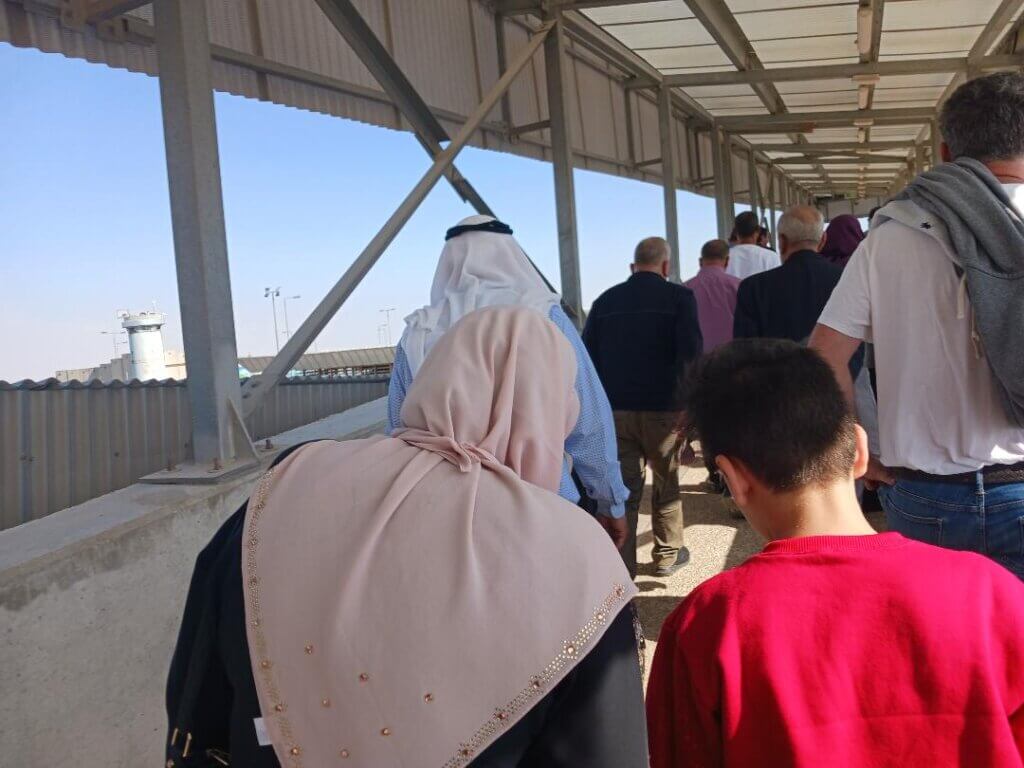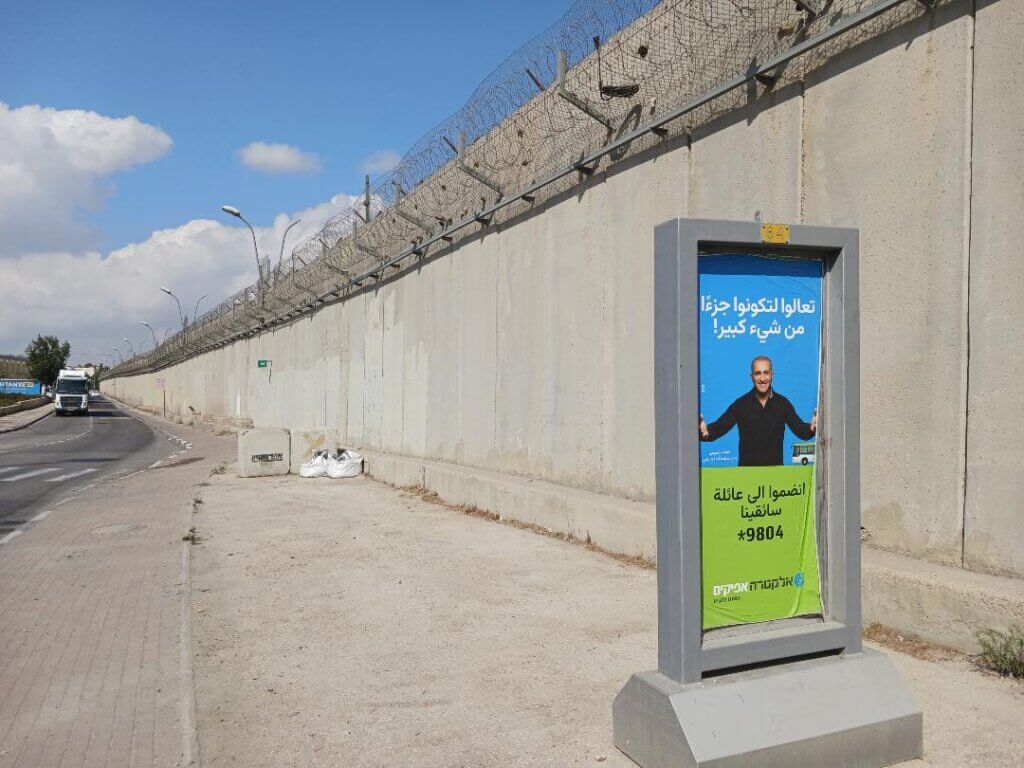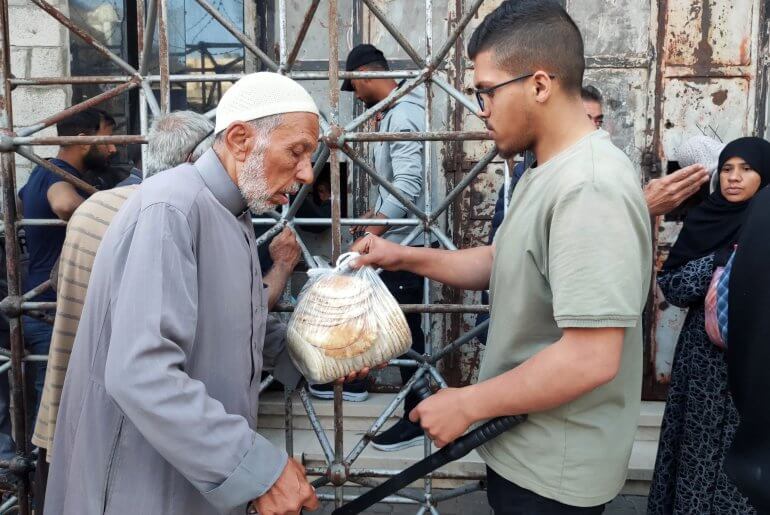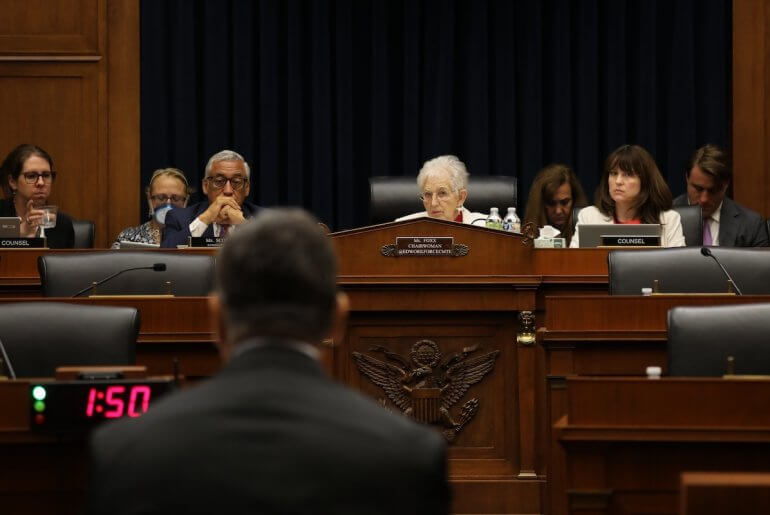Every time I visit Israel and Palestine I come home so struck by the injustice that I say to myself, Well you are a writer, you should be able, in 1000 words or so, to convey the enormity of what you have seen so that the system falls apart like a house of cards for an American reader. This is my latest effort to do just that.
The main impression I had on this visit, is the feeling of Separation. I was bowled over by how separate the Israeli Jews are from the Palestinians, and the huge efforts undertaken to prevent mixing of cultures. When you go through the airport or West Jerusalem or Tel Aviv, you feel like you are in a city in Eastern Europe. I saw no men in the airport in traditional Arab dress. I saw a few women wearing the hijab. You don’t see many Arabic signs. You don’t see displays of Arab crafts or furnishings, you don’t see the sights and smells of Arab markets or streetlife. No, the Zionists brought their own society to the Middle East.
All the time you are here you reflect that you are plunk in the middle of the “Arab world.” Not long ago, the culture here was largely Muslim. A few decades ago, you could catch a bus from Jerusalem to Damascus, or Beirut, or Cairo, or Amman or Baghdad. Now you can’t do any of that. Jerusalem has been declared the “eternal capital of the Jewish people,” and there are high walls topped by concertina wire to separate it from the Arab masses. A historic Palestinian neighborhood was bulldozed so that Jews could sanctify the Western Wall, ala the Vatican. And even liberal Zionists idealize this separation. The late novelist Amos Oz said that Jews and Palestinians need a “divorce” and separate houses, and he is a hero to J Street and Americans for Peace Now.
Israel really has established an outpost of civilization, as it conceives these matters, in a very traditional colonial mindset.

Any time you cross over into that other world, you must go through militarized checkpoints, and the culture is entirely different. The roads are narrower, the signs are mostly in Arabic. Many people wear traditional dress, and the street life strikes this foreigner as Arab.
The amazing thing about Israel is that it has pulled off colonization in an anti-colonial era. But I am not trying to analyze it, just to convey the feeling. It feels weird and unfair that the Zionists have imposed this order, and they understand this. They know it’s unfair, and so there are guns everywhere and the voters have lately elevated a racist fascist, Itamar Ben-Gvir, because Israelis know that Palestinians don’t like being a subject people, so they must preserve the order through brute force and power politics. You see the brute force all around. All the young soldiers on the buses or in the roads with their guns dangling at their sides. They’re not here for the Syrians or the Egyptians or the Jordanians, or Iraqis, Israel’s enemies of old. No, they’re here for the Palestinians on the other side of those concrete walls, because Palestinians resist the whole idea of a “Jewish state.”
As you would too if it were established in your city.
The racial profiling is rampant before your eyes. I sauntered through Damascus Gate at midnight. The young Palestinian just behind me got stopped by soldiers demanding his I.D. card.
Of course, Israelis speak of what a bad neighborhood they live in. The only answer to that propaganda is that if you throw people out of their houses and off their land and live there for 75 years without any gesture to make things right, no you just keep on taking their property, I promise you — you will live in a bad neighborhood.
Here is a simple proof of the unfairness. Every day Palestinians in Israel and the occupied territories use money on which is imprinted the portraits of men who directed their ethnic cleansing and massacres.* They travel inside Israel on roads named after these men too. I found this unsettling and embarrassing, being a witness to such humiliation. In talking to Palestinians in Haifa, I caught the name Ben-Gurion Avenue in my throat — I was afraid the mere utterance would damage their dignity.
I often thought about the promotion back in the U.S. of the “startup nation,” with its biotech and cyber industries that are said to help the world. The miraculous startup nation justifies its presence with its material advantages and Nobel Prizes (one Nobelist came to a shiva I attended in Jerusalem) as if that makes its rule acceptable to Palestinians. But of course it doesn’t. They have fewer or no rights, and it is rubbed in their faces all the time. There is something crude and dispiriting about this; you don’t perpetuate apartheid without consequences to all concerned. The journalist Tom Dallal shared with me this photo of riding a train with a soldier who pointed his gun between his legs the whole time without regarding it as rude or unusual.

When a Palestinian in Ramallah asked if it was offensive to American Jewish visitors to compare Israeli soldiers to Nazis, my colleague Scott Roth shook his head and said the Holocaust is pertinent. “You can’t build a society on trauma. They built Israeli society on trauma.”
Roth says that Israel brings out the worst in people. He wandered into the King David Hotel lobby one morning and saw a group of American visitors looking at the famous signatures set in tiles in the floor, and one began jumping up and down on Obama’s signature, laughing as she called out expletives. This kind of abuse and invective is normal here. Just look at the picture Itamar Ben-Gvir lately posted of the Palestinian politician Ahmad Tibi wheeling a suitcase in Ben Gurion airport. “Great news. Leave and don’t come back.” (Michael Koplow’s translation.)
You feel that crudeness and the tension. A Palestinian friend told me that when he visited New York recently he experienced visceral shock in a restaurant when he heard a loud Israeli conversation at a nearby table. “There is a word in Arabic that means to feel electrocuted — batkahrab,” he said. “These are the same voices that when I usually hear them, they are shouting at me that I have done something wrong.” Yes, young soldiers, barking at my friend, an architect in his 40s.
You feel the tragedy of it. You observe that Palestinians are human beings just like anyone with aspirations and dreams and pride and dignity, and yet you see them being put down before your eyes and having to bear it to survive. I keep thinking of a girl of 20 or 21 with earphones and fashionable clothing getting off the bus at Qalandiya checkpoint with her bag over her arm, that said, Van Gogh Museum, Amsterdam. She reminded me of me and my friends at her age, showing off our taste. But she has no freedom of movement, and no political rights.

That’s my overwhelming sense of this visit. People not very different from me are persecuted at every turn. Many international human rights organizations have now laid out the apartheid argument in systematic legal analyses. I can only tell you about the feeling of it: Everywhere you go these Arab people are to be separated from the Jewish state and their culture erased. The shame I felt as a Jewish person is unquantifiable, and is the reason I will keep doing this work. Jewish values meant one thing when I was raised – “That which is obnoxious to you don’t do to another person,” in Hillel’s words. Or as Americans say, the Golden Rule. That value is trashed everywhere I went in Israel and Palestine.
It can’t last. When you see an unfair arrangement balanced totally on massive military and financial advantage and power politics, but unbearable to the subjugated people, history tells you it can’t last. Even the State Department acknowledges this when they say “the status quo is unsustainable.” When and how it falls who can say. But it can’t last.
*Commenter Jon S. responded to this piece by saying that Israeli banknotes carry the images of poets and artists, and that plans reported in the media to put Rabin and Begin on banknotes never came to pass. I take his point, but Golda Meir and Ze’ev Jabotinsky have appeared on Israeli banknotes in the past.
Philip Weiss
Philip Weiss is senior editor of Mondoweiss.net and founded the site in 2005-06.




“The main impression I had on this visit, is the feeling of Separation. I was bowled over by how separate the Israeli Jews are from the Palestinians, and the huge efforts undertaken to prevent mixing of cultures.”
https://therealnews.com/shever1105israelborder
And, in fact, the wall, even though Israel calls it the security barrier officially, in a meeting in which I was present, the brigadier general Yair Golan, the former commander of the Israeli forces in the West Bank, told the people present that in fact the wall [was] not built in order to provide security. It was–his orders that he received from the Israeli government were that the wall’s first purpose is to separate between people, meaning that the wall’s true intention is to prevent Israelis and Palestinians from meeting each other, becoming friends, getting married, and its secondary purpose is to provide security.
1 of 2
Israel’s Ascendant Far Right Can’t Be Understood by Analogy (jewishcurrents.org)
“Israel’s Ascendant Far Right Can’t Be Understood by Analogy” In other countries, the right clashes with the center over the basic nature of the state—but Israel’s Itamar Ben-Gvir & his rivals are on the same page about ethnocracy. By Peter Beinart, Nov.7/22
EXCERPT:
“NOW THAT ITAMAR BEN-GVIR appears poised to become a power broker in Israel’s next government, journalists are grasping for analogies with far-right upstarts in other lands. The Telegraph says he is ‘reminiscent of French hard-Right opposition leader Marine Le Pen.’ Haaretz notes that ‘Americans are already viewing Ben-Gvir as a Trump-like figure.’ According to The Guardian, ‘Ben-Gvir’s rise is reflective of wide authoritarian political trends around the world.’
“The impulse to draw comparisons to figures like Le Pen, Trump, Italian Prime Minister Giorgia Meloni, & Indian Prime Minister Narendra Modi is understandable. Ben-Gvir—a follower of the late Rabbi Meir Kahane, whose party was banned in Israel for “incitement to racism” in the 1980s—is a media-hound & a racist; he delights in threatening violence, & he’s risen swiftly from the political margins to the corridors of power.
“But these parallels are mostly wrong. Ben-Gvir is different because Israel is different. In France, the US, Italy, & India, right-wing leaders are seeking—to varying degrees—to create ethnocracies, states that define themselves as belonging to a dominant ethnic, religious, or racial group. Their centrist opponents—to varying degrees—support legal equality for all citizens. This divide creates deep ideological polarization. But Israel is not deeply ideologically polarized. It’s already an ethnocracy & no major political party wants to change that. That’s what sets Ben-Gvir apart from figures like Trump & Le Pen: His rivalry with his centrist foes may be politically fierce, but it’s not a contest over the basic definition of the state. In the global struggle between group supremacy & equality under the law, Ben-Gvir & his centrist rivals are on the same side. (cont’d)
.
2 of 2
“To grasp what sets Ben-Gvir & the Israeli context apart, look at immigration, the signature grievance of Le Pen, Meloni, & Trump. Each has built a political brand on promising to stop migrants from the Global South from undermining their nation’s white, Christian character. Trump proposed a wall & a Muslim ban. Meloni desires a naval blockade to prevent migration across the Mediterranean. Le Pen wants to tighten asylum laws & end birthright citizenship so children born to migrant parents in France don’t gain legal equality. Immigration doesn’t enjoy the same political salience in India because it’s not as attractive a destination for migrants. But even there, Modi has tried to alter asylum laws to exclude Muslims, & thus bolster Hindu demographic dominance.
“Ben-Gvir doesn’t need to propose these kinds of changes. He does fervently oppose admitting asylum seekers, but restricting migration to preserve Israel’s ethnic & religious identity hasn’t been central to his rise. The reason is simple: Israel already does that. As a Jewish state, it radically privileges Jewish immigration. Jews can move to Israel & gain citizenship immediately. For non-Jews, by contrast, moving to Israel & gaining citizenship is extremely difficult. For Palestinians whose families were expelled from what is now Israel, it’s impossible. Israel’s immigration policy is already more discriminatory than anything being proposed by Le Pen, Meloni, Modi, or Trump.
“Ben-Gvir’s centrist rivals fervently support this status quo. In 2003, Israel passed a Citizenship Law preventing Palestinians from the West Bank or Gaza Strip who marry Palestinian citizens of Israel from thereby gaining citizenship themselves. The law has been extended every year since then. Last year, Benjamin Netanyahu’s Likud Party flirted with opposing the extension—despite favoring it substantively—as a ploy to try to topple then-Prime Minister Naftali Bennett’s multi-party coalition. In response, Israel’s centrist politicians maneuvered frantically to ensure that the extension passed. The Citizenship Law was vital, declared then-foreign minister Yair Lapid, because “it’s one of the tools aimed at ensuring Israel’s Jewish majority.” “This alignment on immigration reflects an alignment on the fundamental nature of the state…”
excellent article
Every day Palestinians in Israel and the occupied territories use money on which is imprinted the portraits of men who directed their ethnic cleansing and massacres.
This is simply untrue. Israeli currency carries portraits of poets:
20 shekel bill: the poetess Rachel (Bluwstein) 1890-1931
50 shekel: the poet Shaul Tchernichovsky 1875-1943
100 shekel: the poetess Leah Goldberg 1911-1970
200 shekel: the poet Nathan Alterman 1910-1970
See here:
https://www.boi.org.il/en/Currency/CurrentCurrencySeries/Pages/Default.aspx#Top
I don’t know why Phil Weiss would want to deliberately lie about this, but he sure is mistaken.